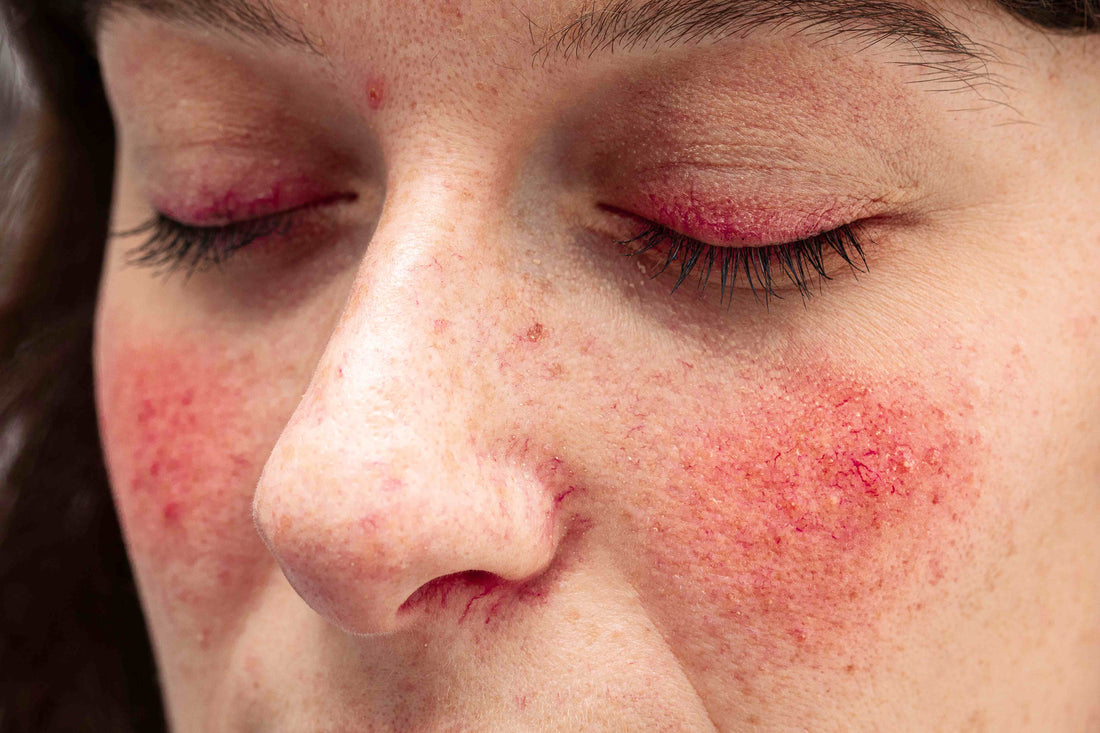
The Derm-approved Rosacea Routine
Selecting skincare that works for Rosacea can be tricky, so we quizzed Professor Caitriona Ryan from the Institute of Dermatologists, Ireland, about the products, ingredients and treatments to include and avoid...
What to include:
Gentle staples: The skin barrier is impaired, so harsh ingredients and complex regimens can aggravate the skin. This means that one of the most important things I tell my rosacea patients is to keep their skincare regimen as simple and mild as possible, for example using a mild, cream-based cleanser in the morning and evening.
SPF: UV plays a significant role in rosacea, so one of the most important steps is to use a daily zinc-containing SPF. Tinted zinc SPFs have the dual advantage of protecting against visible light (from devices etc) and the tint often neutralises the redness of rosacea. Lots of my male patients love it for this reason.
Retinoids – with care! One myth I try to dispel is that patients with rosacea cannot use retinoids. My rosacea patients want an anti-ageing, collagen-stimulating skincare regimen just like everyone else. It is important, however, to choose less irritating formulations and so I typically avoid prescription strength tretinoin in rosacea patients. Instead, I opt for retinols or similar retinoids, starting slowly and building up frequency, for example, by using the retinoid every 3rd night for a few weeks, then every 2nd night, and finally increasing to every night. It really helps when retinoids have a formulation that includes anti-inflammatory and hydrating agents.
Intense Pulse Light (IPL): Without a doubt, this is the most effective treatment for those who have rosacea. It reduces redness and the broken veins that are so bothersome for men and women with this skin condition. It can really be a gamechanger for patients and dramatically improve their appearance and tendency to flush.
Cosmetic procedures are typically safe, including anti-wrinkle injections, dermal fillers, lasers, platelet rich plasma injections, Ultherapy, Philart Next and Profilo. Microdoses of botulinum toxin (Botox) can be very helpful for the flushing of rosacea.
What to avoid:
The sun: I typically ask my rosacea patients to avoid chemical sunscreen and to apply zinc containing SPF every day of the year.
Some actives and acids: I suggest avoiding chemical peels, glycolic and salicylic acids. Some patients find that certain formulations of Vitamin C can aggravate their rosacea. I prefer my patients to opt for the THD version (Tetrahexyldecyl ascorbate) of Vitamin C if this is an issue.
What to include:
Gentle staples: The skin barrier is impaired, so harsh ingredients and complex regimens can aggravate the skin. This means that one of the most important things I tell my rosacea patients is to keep their skincare regimen as simple and mild as possible, for example using a mild, cream-based cleanser in the morning and evening.
SPF: UV plays a significant role in rosacea, so one of the most important steps is to use a daily zinc-containing SPF. Tinted zinc SPFs have the dual advantage of protecting against visible light (from devices etc) and the tint often neutralises the redness of rosacea. Lots of my male patients love it for this reason.
Retinoids – with care! One myth I try to dispel is that patients with rosacea cannot use retinoids. My rosacea patients want an anti-ageing, collagen-stimulating skincare regimen just like everyone else. It is important, however, to choose less irritating formulations and so I typically avoid prescription strength tretinoin in rosacea patients. Instead, I opt for retinols or similar retinoids, starting slowly and building up frequency, for example, by using the retinoid every 3rd night for a few weeks, then every 2nd night, and finally increasing to every night. It really helps when retinoids have a formulation that includes anti-inflammatory and hydrating agents.
Intense Pulse Light (IPL): Without a doubt, this is the most effective treatment for those who have rosacea. It reduces redness and the broken veins that are so bothersome for men and women with this skin condition. It can really be a gamechanger for patients and dramatically improve their appearance and tendency to flush.
Cosmetic procedures are typically safe, including anti-wrinkle injections, dermal fillers, lasers, platelet rich plasma injections, Ultherapy, Philart Next and Profilo. Microdoses of botulinum toxin (Botox) can be very helpful for the flushing of rosacea.
What to avoid:
The sun: I typically ask my rosacea patients to avoid chemical sunscreen and to apply zinc containing SPF every day of the year.
Some actives and acids: I suggest avoiding chemical peels, glycolic and salicylic acids. Some patients find that certain formulations of Vitamin C can aggravate their rosacea. I prefer my patients to opt for the THD version (Tetrahexyldecyl ascorbate) of Vitamin C if this is an issue.
